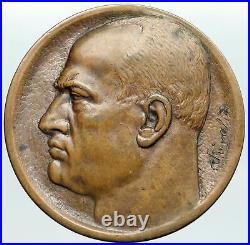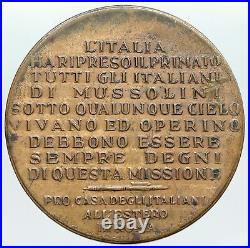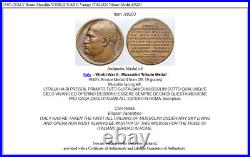


Item: i89203 Authentic Medal of. World War II – Mussolini Tribute Medal 1940′s Bronze Medal 41mm (28.19 grams) Musollini facing left. L’ITALIA HA RI PRESOIL PRIMATO TUTTI GLI ITALIANI DI MUSSOLINI SOTTO QUALUNQUE CIELO VIVANO ED OPERINO DEBBONO ESSERE SEMPRE DEGNI DI QUESTA MISSIONE PRO CASA DEGLI ITALIANI ALL ESTERO IN ROMA, Inscription. Benito Amilcare Andrea Mussolini (29 July 1883 – 28 April 1945) was an Italian politician and journalist who founded and led the National Fascist Party. He was Prime Minister of Italy from the Fascist coup d’état in 1922 until his deposition in 1943, and Duce (“Leader”) of Italian Fascism from the establishment of the Italian Fasces of Combat in 1919 until his execution in 1945 during the Italian Civil War. As dictator of Italy and founder of the fascist movement, Mussolini inspired other far right rulers such as Adolf Hitler, Francisco Franco, and António de Oliveira Salazar. Mussolini was originally a socialist politician and a journalist at the. In 1912, he became a member of the National Directorate of the Italian Socialist Party (PSI), but was expelled from the PSI for advocating military intervention in World War I, in opposition to the party’s stance on neutrality. In 1914, Mussolini founded a new journal. Il Popolo d’Italia. And served in the Royal Italian Army during the war until he was wounded and discharged in 1917. Mussolini denounced the PSI, his views now centering on Italian nationalism instead of socialism, and later founded the fascist movement which came to oppose egalitarianism and class conflict, instead advocating “revolutionary nationalism” transcending class lines. On October 31, 1922, following the March on Rome (October 28-30), Mussolini was appointed prime minister by King Victor Emmanuel III, becoming the youngest individual to hold the office up to that time. After removing all political opposition through his secret police and outlawing labor strikes, Mussolini and his followers consolidated power through a series of laws that transformed the nation into a one-party dictatorship. Within five years, Mussolini had established dictatorial authority by both legal and illegal means and aspired to create a totalitarian state. In 1929, Mussolini signed the Lateran Treaty with the Vatican, ending decades of struggle between the Italian state and the Papacy, and recognized the independence of Vatican City. Mussolini’s foreign policy aimed to expand the sphere of influence of Italian fascism. In 1923, he began the Libyan Genocide and ordered the bombing of Corfu in retaliation for the murder of an Italian general. In 1936, Mussolini formed Italian East Africa (AOI) by merging Eritrea, Somalia and Ethiopia following the Abyssinian crisis and the Second Italo-Ethiopian War. In 1939, Italian forces occupied Albania. Between 1936 and 1939, Mussolini ordered the successful Italian military intervention in Spain in favor of Francisco Franco during the Spanish civil war. Mussolini’s Italy initially tried to avoid the outbreak of a second global war, sending troops at the Brenner Pass to delay Anschluss and taking part in the Stresa front, the Lytton Report, the Treaty of Lausanne, the Four-Power Pact and the Munich Agreement. However, Italy then alienated itself from Britain and France by aligning with Germany and Japan. Germany invaded Poland on 1 September 1939, resulting in declarations of war by France and the UK and the start of World War II. On 10 June 1940, Mussolini decided to enter the war on the Axis side. Despite initial success, the subsequent Axis collapse on multiple fronts and eventual Allied invasion of Sicily made Mussolini lose the support of the population and members of the Fascist Party. As a consequence, early on 25 July, the Grand Council of Fascism passed a motion of no confidence in Mussolini; later that day King Victor Emmanuel III dismissed him as head of government and had him placed in custody, appointing Pietro Badoglio to succeed him as Prime Minister. After the king agreed to an armistice with the Allies, on 12 September 1943 Mussolini was rescued from captivity in the Gran Sasso raid by German paratroopers and. Commandos led by Major Otto-Harald Mors. Hitler, after meeting with the rescued former dictator, then put Mussolini in charge of a puppet regime in northern Italy, the Italian Social Republic Italian. RSI, informally known as the. Causing a civil war. In late April 1945, in the wake of near total defeat, Mussolini and his mistress Clara Petacci attempted to flee to Switzerland, but both were captured by Italian communist partisans and summarily executed by firing squad on 28 April 1945 near Lake Como. The bodies of Mussolini and his mistress were then taken to Milan, where they were hung upside down at a service station to publicly confirm their demise. Italy, officially the Italian Republic (Italian: Repubblica Italiana), is a unitary parliamentary republic in Europe. Italy covers an area of 301,338 km. (116,347 sq mi) and has a largely temperate climate; due to its shape, it is often referred to in Italy as lo Stivale (the Boot). With 61 million inhabitants, it is the 4th most populous EU member state. Located in the heart of the Mediterranean Sea, Italy shares open land borders with France, Switzerland, Austria, Slovenia, San Marino and Vatican City. Since ancient times, Greek, Etruscan, Celtic, and other cultures have thrived on the Italian Peninsula. Rome ultimately emerged as the dominant power, conquering much of the ancient world and becoming the leading cultural, political, and religious centre of Western civilisation. The Renaissance led to a flourishing of Italian culture, producing famous scholars, artists, and polymaths such as Leonardo da Vinci, Galileo, Michelangelo and Machiavelli. Italian explorers such as Marco Polo, Christopher Columbus, Amerigo Vespucci, and Giovanni da Verrazzano discovered new routes to the Far East and the New World, helping to usher in the European Age of Discovery. Nevertheless, Italy remained politically fragmented and fell prey to European powers such as France, Spain, and later Austria, subsequently entering a long period of decline that lasted until the mid-19th century. After various unsuccessful attempts, the second and the third wars for Italian independence resulted in the eventual unification of most of present-day Italy by 1866. From the late 19th century to the early 20th century, the new Kingdom of Italy rapidly industrialised and acquired a colonial empire, becoming a great power. However, southern and rural areas of the country remained largely excluded from industrialisation, fuelling a large and influential diaspora. Despite being one of the main victors in World War I, Italy entered a period of economic crisis and social turmoil, leading the way to the rise of a Fascist dictatorship in 1922. The subsequent participation in World War II on the Axis side ended in military defeat, economic destruction and civil war. In the years that followed, Italy abolished the monarchy, reinstated democracy, and enjoyed a prolonged economic boom, thus becoming one of the world’s most developed nations. Italy has the third largest economy in the Eurozone and the eighth largest economy in the world. It has a very high level of human development and enjoys the highest life expectancy in the EU. Italy plays a prominent role in global military, cultural and diplomatic affairs and is also considered to be a major regional power in Europe. Italy is a founding and leading member of the European Union and the member of numerous international institutions, including the UN, NATO, the OECD, the OSCE, the WTO, the G7/G8, G20, the Union for the Mediterranean, the Council of Europe, Uniting for Consensus, and many more. As a reflection of its vast cultural wealth, Italy is home to 51 World Heritage Sites, the most in the world, and is one of the most visited countries. World-renowned expert numismatist, enthusiast, author and dealer in authentic ancient Greek, ancient Roman, ancient Byzantine, world coins & more. Ilya Zlobin is an independent individual who has a passion for coin collecting, research and understanding the importance of the historical context and significance all coins and objects represent. Send me a message about this and I can update your invoice should you want this method. Getting your order to you, quickly and securely is a top priority and is taken seriously here. Great care is taken in packaging and mailing every item securely and quickly. What is a certificate of authenticity and what guarantees do you give that the item is authentic? You will be very happy with what you get with the COA; a professional presentation of the coin, with all of the relevant information and a picture of the coin you saw in the listing. Additionally, the coin is inside it’s own protective coin flip (holder), with a 2×2 inch description of the coin matching the individual number on the COA. Whether your goal is to collect or give the item as a gift, coins presented like this could be more prized and valued higher than items that were not given such care and attention to. When should I leave feedback? Please don’t leave any negative feedbacks, as it happens sometimes that people rush to leave feedback before letting sufficient time for their order to arrive. The matter of fact is that any issues can be resolved, as reputation is most important to me. My goal is to provide superior products and quality of service. How and where do I learn more about collecting ancient coins? Visit the Guide on How to Use My Store. For on an overview about using my store, with additional information and links to all other parts of my store which may include educational information on topics you are looking for. This item is in the category “Coins & Paper Money\Exonumia\Medals”. The seller is “highrating_lowprice” and is located in this country: US. This item can be shipped worldwide.
- Year: 1940′s
- Country/Region of Manufacture: Italy
- Type: Medal
- Composition: Silver